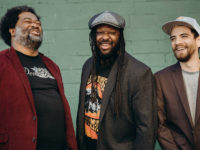Fourteen (March 25, 2014, Pi Recordings) isn’t Dan Weiss’s fourteenth record (it’s his fifth), nor is it the number of tracks on the album, nor does it pertain to the year it’s out (as in “’14”). No, this is telling us how many musicians performed on what is inarguably the drummer, leader and composer’s magnum opus to date.
Weiss is a widely respected drummer’s drummer who we’ve already encountered on great records by Pete Robbins, Miles Okazaki, Rudresh Mahanthappa, and Weiss’ Pi Recordings label mate Amir ElSaffar. As a leader, he’s made records that both showcase his extensive study with East Indian rhythm cycles and his trio with pianist Jacob Sacks and bassist Thomas Morgan. But Fourteen opens up a completely new frontier in Weiss’ body of work.
A fourteen-piece band conjures up an imagery of a jazz big band, playing in the tradition of Ellington, Goodman or even a contemporary figure like Gerald Wilson, but this music Weiss and his companions make from a band this size is nothing like that. He distilled his background from various areas of music both stylistically and geographically diverse, and he contemplated in his mind who would play each part as he wrote the music. Okazaki, Sacks and Morgan all figured into his plans, as did Matt Mitchell (piano, glockenspiel, organ), Katie Andrews (harp) and Stephen Cellucci (percussion). And yep, there’s a robust horn section: David Binney (alto sax), Ohad Talmor (tenor sax), Jacob Garchik (trombone, tuba) and Ben Gerstein (trombone). For the final, most distinctive touch, Weiss also brought in a trio of vocalists: Lana Cen?i?, Judith Berkson and Maria Neckam, and he utilized them all as if they were an extra horn section, with no lyrics sung.
These seven through-composed pieces, all called simply “Part One,” “Part Two,” etc., run right into each other to give the effect of a multi-suite symphony. But several moods and motifs exist within each part, too, and Weiss is very picky about how and when to deploy the means at his disposal.
No Count Basie swinging goes on within this record, but signs of influences from many other places can be found everywhere. Okazaki’s classical guitar paired with Andrews’ harp opens “Part Two”, a song that ends up with its rhythms rendered by palmas (hand-clapping) and voices. Weiss’ East Indian knowledge finds its way into the album in mostly discreet ways, but most explicitly in his brief konnakul vocal during “Part Three.”
Weiss’ conception for his music is not only broad, but deep; for “Part One” and “Part Six,” he starts out with light, sparse instrumentation, but discreetly slides in layers of harmonic components from voices and brass. Before long, the vacuum he’s created at the beginning is eliminated, but though there are a lot of moving parts, you’re given time to let each facet sink in. And it’s fascinating to ponder.
Mitchell’s organ (said to be the same one played on the original recording of “In-A-Gadda-Da-Vida”) along with Okazaki’s fuzzy guitar lead a charge into prog rock for “Part Four,” as majestic chords blown by the brass rise and fall. Other times, Weiss seeks to create the gentlest sounds possible coming from so many inputs, most apparent during “Part Seven,” which begins with a spare piano and low hum of Garchik’s tuba. The tuba eventually fades out, an acoustic guitar slides into its place as the song turns from dark to hopeful. And then, it’s gone; the album ends.
What Weiss has created with Fourteen is like nothing he’s done before, and probably unlike what anybody has done before. It’s not really jazz, it’s not classical, it’s not rock, or world fusion, but it couldn’t exist without those styles. Above all, it certainly couldn’t exist without the fertile imagination of Dan Weiss.
[amazon_enhanced asin=”B00HVCHMDS” /] [amazon_enhanced asin=”B00E9E4EWS” /] [amazon_enhanced asin=”B00EBJ61PO” /] [amazon_enhanced asin=”B00BNWWUVG” /] [amazon_enhanced asin=”B007TW7C4E” /]
Visit Dan Weiss’ website for more info.




